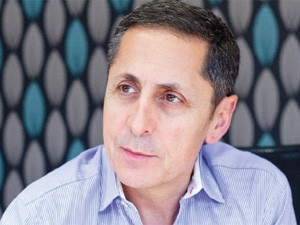
Ivan Epstein looks the same now as he did when I first met him 15 years ago: thin and wiry, alert and always a little guarded, with hair that's flecked with grey. The conversation hasn't changed much either, as he talks of colleagues from the past who are still his colleagues of the present. All that's changed is the name of his company, switching from Softline to Sage to reflect the fact that the company Epstein founded was acquired by the London-listed Sage group in 2003.
There were some turbulent times over the years, with Softline enjoying phenomenal growth, listing with a bang, dropping with a clang when the dotcom bubble burst, a failed management buy-back, and then its acquisition by Sage.
That's quite a roller-coaster ride for someone who trained for the traditionally stable and predictable career of auditing.
Entrepreneurial heart
Epstein co-founded Softline with Alan Osrin in 1988, when small businesses were starting to move from manual accounting to PC-based systems. Old-timers may remember Softline's first product, Brilliant Accounting.
"We were auditors, but it was the start of packaged software," Epstein says. "Legacy systems were in place but only large companies could afford them, so we were in the right place at the right time. We started with almost zero capital base and it was mainly due to good marketing."
When Softline was sold to Sage, Epstein could have stepped aside and returned to being an entrepreneur, or just enjoyed the money. Instead, he still remains with the company he founded 25 years ago.
Yet he bristles at the suggestion that he's no longer an entrepreneur, waving his hand around the impressive boardroom and saying corporate surroundings haven't corroded his entrepreneurial heart.
"I'm still not a corporate man. I don't want to be one. As a listed company, you have to comply with corporate governance requirements, but you can still maintain the entrepreneurial flair and spirit in the way you conduct business operations."
He has an interesting and almost maverick attitude to formal business processes, believing they can stifle companies by being too restrictive.
I'm still not a corporate man. I don't want to be one.
Ivan Epstein, Sage AAMEA
Softline began with a vision and a goal but no business plan, he says. "It wasn't much more than a dream but we definitely had a vision of building something large." As entrepreneurs, they didn't sit and think about the formalities, they just got on with the show.
I ask if that was due to ignorance of what starting a business is supposed to require, or from a gung-ho spirit that just saw them jump in without months of preparation.
"Sometimes ignorance is actually a blessing in starting a business, because if you knew all the pitfalls, you wouldn't do it. I would have stayed in auditing," he says.
When a business gets to a certain size, people put in too many checks and balances, he believes. "It's a mistake because the best way to run a big business is with the heart of a small one. They set up massive HR departments but it's not all necessary. Too many business processes create blockages, and blockages don't make for better business; they slow down the tempo. So we try to maintain our founding roots of entrepreneurship within the best of our abilities and also within the confines of having to report as a public company."
The space we're in is very exciting. The changing landscape of the technology keeps you engaged.
Ivan Epstein, Sage AAMEA
Epstein chairs the judging panel for the Ernst & Young Entrepreneur Award, which he won himself in 1999. I ask if he shares his opinions about corporate structures and strictures with the contestants he assesses. "You don't give them advice because most times, these entrepreneurs can build bigger businesses than you have yourself," he says. "What you look for within the entrepreneur is the risk profile and the individual hardship they've encountered, how they've overcome it and the level of business they have built and if it's become sustainable."
Exciting space
At Sage, Epstein fills two roles: serving as the CEO of Sage AAMEA (Africa, Australia, Middle East & Asia) and helping to run the global group.
So what does he do when he's not at work: "I'm at work, or I'm thinking about it." Since he has a wife and three children, I ask whether he is also a grandfather. He looks shocked and mildly offended. "I can't believe you've asked me that," he says, until we do the maths and confirm that he could be.
He gives the same raised eyebrow response when I ask if he'll ever retire. Of course not, he says. Why would he when he's working with wonderful, stimulating people. "There's a lot of passion for the business. It's something we were part of creating right from the ground up and most of the original founders are still here from the acquisitions we made. The space we are in is very exciting. The changing landscape of the technology keeps you excited, and moving into different countries is exciting."
Then he ponders for a moment, and says if he ever did retire ? just if ? then he would still keep busy by getting more involved in the various investments he has made. One is a property development company, which he finds stimulating because it involves completely different skills.
The years haven't slowed Epstein down or made him complacent. If anything, his experience seems to have given him even more opportunities. "There is always so much else one can do that I don't think in terms of retirement. Even if I decided not to be here, I'd keep investing and build something and advise people who are starting out in business on how to be more effective because people come to me all the time for advice like that."
First published in the February 2014 issue of ITWeb Brainstorm magazine.
* Article first published on brainstorm.itweb.co.za
Share